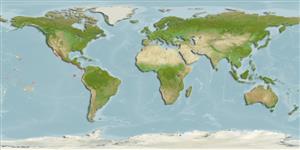Common names from other countries
>
Blenniiformes (Blennies) >
Blenniidae (Combtooth blennies) > Salariinae
Etymology: Hypsoblennius: Greek, hypsi = high + Greek, blennios = mucus (Ref. 45335).
More on author: Günther.
Environment: milieu / climate zone / depth range / distribution range
पारिस्थितिकी
समुद्री प्रवाल-भित्ति संयुक्त; गहराई सीमा 1 - 10 m (Ref. 37955), usually 2 - 6 m (Ref. 5227). Tropical
Eastern Pacific: central Gulf of California to Peru, including the Galapagos and Cocos islands.
आकार / वज़न / Age
Maturity: Lm ? range ? - ? cm
Max length : 12.0 cm TL पुल्लिंग / अलिंग; (Ref. 2272)
Adults are found in rocky areas (Ref. 37955). They inhabit empty barnacle shells, often with only the head protruding. They feed by nabbing bits of floating food (Ref. 5227). Oviparous (Ref. 205). Eggs are demersal and adhesive (Ref. 205), and are attached to the walls of the parent's shelter (Ref. 56053). Eggs are brooded by the male parent (Ref. 56053). Minimum depth reported from Ref. 5227.
Oviparous, distinct pairing (Ref. 205).
Thomson, D.A., 1987. Reef fishes of the Sea of Cortez. The rocky-shore fishes of the Gulf of California. The University of Arizona Press, Tucson. 302 p. (Ref. 5592)
IUCN Red List Status (Ref. 130435)
CITES (Ref. 128078)
Not Evaluated
Threat to humans
Harmless
Human uses
जलजीवालय: व्यापारिक
अधिक जानकारी
Age/Sizeबाढ़Length-weightLength-lengthLength-frequenciesमौरफोमैटरिक्सआकृति विज्ञानलार्वालारवल गतिकीभर्तीबहुतायत
संदर्भजलीयकृषिजलीयकृषि रूपरेखाखींचआनुवंशिकीElectrophoresesहैरेटिबिलटीबीमारीप्रक्रमणMass conversion
सहयोगीयोतस्वीरेStamps, Coins Misc.ध्वनिसिगुयटिरारफ्तारतैरने के प्रकारगिल क्षेत्रOtolithsदिमागदृष्टि
साधन
Special reports
Download XML
इंटरनेट स्रोत
Estimates based on models
Preferred temperature (Ref.
115969): 22.4 - 29.1, mean 26.7 (based on 223 cells).
Phylogenetic diversity index (Ref.
82804): PD
50 = 0.5000 [Uniqueness, from 0.5 = low to 2.0 = high].
Bayesian length-weight: a=0.00741 (0.00335 - 0.01640), b=3.02 (2.83 - 3.21), in cm Total Length, based on LWR estimates for this (Sub)family-body shape (Ref.
93245).
Trophic level (Ref.
69278): 2.0 ±0.00 se; based on food items.
लौटाव (Ref.
120179): ऊंचा, न्यूनतम जनसंख्या दुगनी समय अवलागत 15 महीने। (Preliminary K or Fecundity.).
Fishing Vulnerability (Ref.
59153): Low vulnerability (10 of 100).
